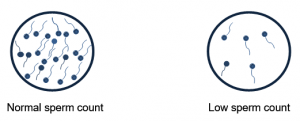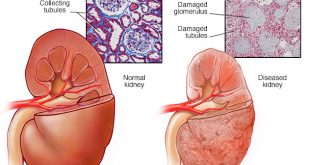The good news is male chronic kidney disease (CKD) patients can and do have children.
Fertility in men with CKD
As a rule, fertility, the ability for a man to impregnate a woman tends to decline as kidney function is lost . This is due to low levels of the hormones that control sperm production (sperm meaning “seed” refers to a man’s reproductive cells.)
The likelihood that a male patient with CKD will be able to father a child decreases with the severity of the kidney disease. The National Kidney Foundation has divided CKD into five stages. Please consult your doctor regarding the staging of your individual kidney disease.
| Stage of CKD | GFR(ml/min/1.73 m2) |
| 1 | > 90 with evidence of kidney damage |
| 2 | 60-89 with evidence of kidney damage |
| 3 | 30-59 |
| 4 | 15-29 |
| 5 | < 15 |
Libido (sex drive) also tends to decline in the setting of kidney disease, due to multiple factors including
- low sex hormone levels,
- anemia (not enough red blood cells)
- depression
- stress
- medications – a number of medications may affect sex drive but patients should never stop their medications without consulting their doctor
Is it possible for men with CKD on dialysis to father a child?
Yes, men on dialysis have been able to father children.
Adequate dialysis and proper treatment of anemia can help.
Children of men with CKD
The most common cause of kidney disease in Malaysia is diabetes mellitus. Diabetes and the tendency to develop kidney disease from diabetes tends to run in families. The good news is that the risk of diabetes mellitus can be greatly reduced with healthy life style. Hence children of a patient with diabetic kidney disease need not necessarily develop diabetes.. In addition, prompt diagnosis and effective management of early diabetic kidney disease can also prevent the development of end stage kidney disease
Children of men with hereditary kidney diseases such as Alport’s syndrome and polycystic kidney disease are at higher risk of developing CKD than the general population.
However, most kidney diseases causing CKD are not hereditary, so CKD patients are not destined to produce children who develop CKD.
Are there any concerns about pregnancies being fathered by male transplant kidney recipients?
Men with CKD who received a kidney transplant and whose kidney function returns to close to normal typically enjoy normal fertility.
There have been no specific recommendations for male transplant recipients with regard to post-transplantation intervals and fathering a child.
The outcomes of pregnancies fathered by male kidney transplant recipients are generally good. The baby’ age at birth, birth weights, frequency of prematurity, and the frequency of birth defects are similar to the general population.
| Last Reviewed | : | 12 September 2013 |
| Writer | : | Dr. Liew Yew Fong |
| Accreditor | : | Dr. Sharmini Diana a/p Parampalan |
 PENDIDIKAN PESAKIT Kementerian Kesihatan Malaysia
PENDIDIKAN PESAKIT Kementerian Kesihatan Malaysia

